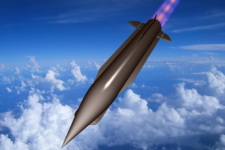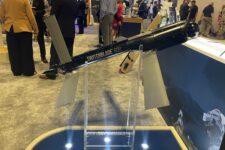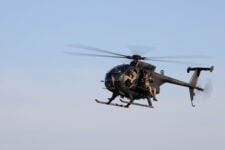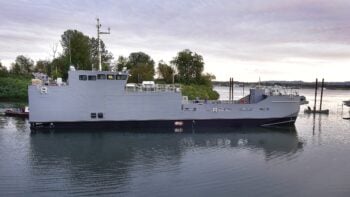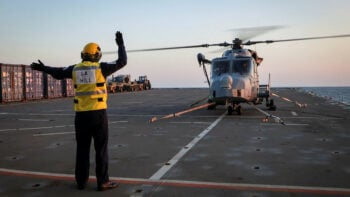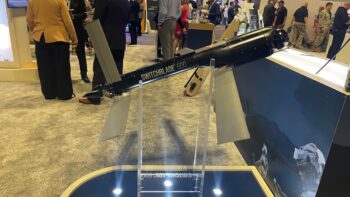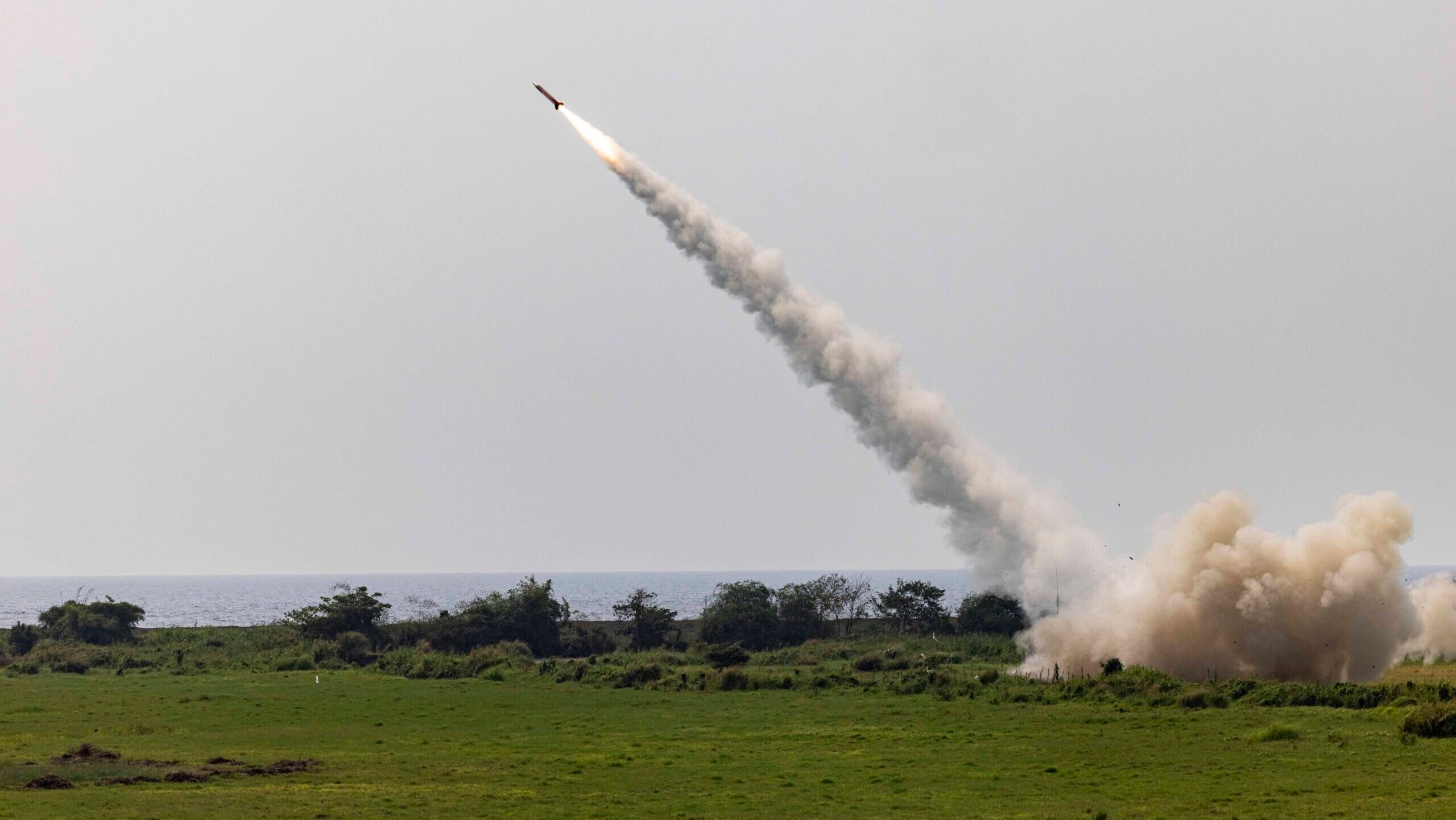
A U.S. Army MIM-104 Patriot surface-to-air missile system is fired for a coastal air defense event during Balikatan 23 at the Naval Education, Training and Doctrine Command, Philippines, April 25, 2023. (U.S. Marine Corps photo by Sgt. Samuel Fletcher)
WARSAW — During an April 15 meeting between Polish Prime Minister Donald Tusk and Danish Prime Minister Mette Frederiksen, Tusk made official what was largely expected around Europe: that Warsaw wants in on the European Sky Shield Initiative (ESSI), a German-led air-defense network still in its infancy.
“Denmark, but also Germany and Great Britain are cooperating in the European Union on the European anti-missile and anti-aircraft defense system. Iran’s attack on Israel confirmed how important it is to have such an installation. … I am glad that the [Danish] Prime Minister responded positively to my intention for Poland to join this project in Europe,” said Tusk.
It was all smiles in the moment, enough that it’s easy to forget that back home Tusk is facing staunch political opposition to the idea of Poland joining up with the other Sky Shield nations.
The next day, during a special meeting of the Council of Ministers, attended by the head of the National Security Bureau [BBN], Jacek Siewiera, the chief of the General Staff of the Polish Army, Gen. Wiesław Kukuła, and the operational commander of the Armed Forces, Maj. Gen. Maciej Klisz, Tusk confirmed that Poland wants to participate in the ESSI and the government’s task is to use “every opportunity, every ally, every installation to arm the Polish sky in such a way that Poland is safe.”
“I accepted with satisfaction the assessment and opinion of the generals and Minister Siewiera that my efforts make sense for Poland to become part of many systems, which should ultimately create an iron dome as tight as possible over the Polish sky” Tusk said. “They confirmed clearly that it is a pity that there was no previous positive decision to participate in the ESSI. We will cooperate within the ESSI.”
But the same day Tusk took fire from Polish President Andrzej Duda, an ally of the previous government led by the nationalist Law and Justice party.
Duda described Sky Shield as a “German business project,” hardly a compliment given the kind of fighting with Germany the previous government attempted to stoke for political purposes. (Tusk, for his part, said “It doesn’t bother me at all that the main initiators of this initiative were Germans.”)
More broadly, Duda slammed the idea as pointless, given that Poland is already pursuing its own initiatives alongside the United States and Britain, including through the Northrop Grumman made Integrated Battle Command System, not operated by Germany.
The Sky Shield effort was launched by Germany in October 2022 as a pan-European effort to provide unified air defenses across the continent, following Russia’s invasion of Ukraine. As of January 2024, nineteen European states — including famously neutral Austria and Switzerland — have signed onto the initiative, with Turkey and Greece expected to join sometime this year.
ESSI will create a multi-layered defense network, with overlapping capabilities: short and very short range (LVS NNbS), medium range (primarily IRIS-T SLM), long range (MIM-104 Patriot) and very long range – exoatmospheric (Arrow 3).
The clash between Duda and Tusk is underlined by the awkward power sharing agreement running Poland at the moment. Duda formally oversees the armed forces, but decisions about arms purchases are made by the government, which Tusk leads, and cannot be blocked by the president. Ultimately, Duda realistically can’t stop ESSI membership, but he can create a headache for Tusk and his government.
At the center of the argument seems to be Siewiera, who reports to Duda, but whom Tusk points to as supporting his position. Cooperation with the United States on defense is crucial and there was no suggestion that Poland should pull out of air defense programs that are already underway, Tusk said, but that also doesn’t mean Poland can’t take part in the more Euro-focused effort as well.
In comments to Polsat News TV after Tusk’s speech, Siewiera offered a nuanced take, seemingly trying to thread the needle between the two leaders’ positions. Currently, he said, there is no offer to include Poland’s defense industry, particularly its domestically built radars.
But, “If these assets are included in the ESSI, taking into account the Polish defense industry, President Duda will be in favor of this form of strengthening security. As far as I know, this matter has not been consulted by the Prime Minister [Tusk] with President Duda so far,” said Siewiera, interviewed by Polsat News TV.
For its part, Poland’s MND published a note last week entitled “Information regarding the ESSI,” which states that “we carefully analyze all international initiatives aimed at strengthening cooperation in the area of air defense with a view to strengthening the security of Poland and the entire NATO. It would be unfavorable to reject participation in any such initiative out of hand. From the point of view of Poland’s security, especially in the context of the air threat from Russia, we should not only engage in initiatives such as ESSI, but even champion them.
“The MND conducted an analysis of the potential benefits of joining ESSI, as a result of which selected areas of the initiative were identified, which may be beneficial for Poland to join. They include, among others: areas of training, doctrine development, or joint purchases and maintenance as part of life cycle management of selected military equipment. Cooperation under the ESSI initiative may be complementary to our national system also due to the fact that ESSI will develop long-range anti-missile defense capabilities thanks to the use of the Arrow-3 system” Warsaw stated.
Importantly the MND maintains that ESSI membership will not impede the Polish IAMD program, which arguably is top-tier in Europe/NATO.
“As is the case with many defense-related issues in Polish debate, the European Sky Shield Initiative has been used as a tool for political fight and in result the discussion around it — with the exception of relatively small real-expert community — is deeply politicized, along party lines,” Marek Świerczyński, head of security and international affairs desk at the Polityka Insight center for policy analysis based in Warsaw, told Breaking Defense.
“The previous right-wing government didn’t like the ESSI, as it didn’t like any German defense (and in fact any at all) initiative in Europe. They presented it mainly as a business initiative of embattled Berlin, even if the possible technology input in ESSI is much wider and German industry isn’t key in it,” he continued.
The liberal-left coalition led by Tusk criticized the Law and Justice party approach as anti-European, and the new government promised to put Poland inside ESSI in the first 100 days of its rule in their election manifesto.
“The commotion seen in media is largely politics-driven. Maybe it was no coincidence that the government decided to make the ESSI statement before the 2nd round of the local elections. The ‘European’ tag on ESSI resonates well in the liberal electorate and some of the vote is clearly Europe driven, as local authorities play a role in distribution of the EU funds,” Świerczyński stressed.


